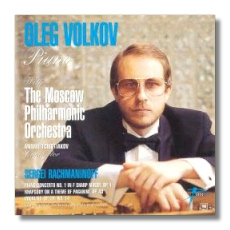
The Internet's Premier Classical Music Source
Related Links
- Rachmaninoff Reviews
- Latest Reviews
- More Reviews
-
By Composer
-
Collections
DVD & Blu-ray
Books
Concert Reviews
Articles/Interviews
Software
Audio
Search Amazon
Recommended Links
Site News
 CD Review
CD Review
Sergei Rachmaninoff

Piano Concerto #1 & Paganini Rhapsody
- Piano Concerto #1 in F Sharp minor, Op. 1
- Rhapsody On A Theme Of Paganini, Op. 43
- Vocalise, Op. 34, #14 (Transcribed for piano solo by Edward J. Leiter)
Oleg Volkov, piano
Moscow Philharmonic Orchestra/Andréi Tchistiakov
Brioso BR111 DDD 61:42
Volkov's take on these works is both a muscular and ponderous one that neither slights the Romanticism nor undercuts the melancholic outpourings so typical of this composer. Certain listeners might wish to supplant some of the austere power with a touch more athletic grace in the faster sections of the Rhapsody, but Volkov is everywhere consistent and makes an excellent case for his approach. In fact, he stakes out a view of these pieces few other pianists are ever likely to espouse: slow tempos abound, and Rachmaninoff never sounded so mature in the Concerto (which was later revised, but in spirit remained an early work), nor so engagingly diabolical in the Rhapsody. Put simply, you're not likely to hear playing with this kind of individual approach in the concert hall or on recordings. Not that Volkov is interpretively wayward or extreme: he rarely italicizes or unexpectedly shifts gears, but, with his rich tone and uncompromisingly serious approach, the end result is, to draw on Roy Harris's famous assessment, a Rachmaninoff more from the "mud" than from the "sugar."
The Rhapsody is one of the slowest-paced I know. Even Vered and Cliburn in their expansive efforts clocked in ahead of Volkov. But Volkov doesn't actually sound slow, or at least doesn't sound annoyingly slow: in the opening variations he imparts weight and clarifies textures; his rendering of the dies irae is solemn and grim, and the diabolical passages that follow are chilling. His reading of the famous 18th variation is sensitively rendered though fairly standard. But, in contrast, the 19th and 20th are less delicate than what you usually hear, being more muscular and emphatic, as if auguring the diabolical elements in the 22nd variation. The ending has rarely been performed with such crushing power, right up to the quiet Paganinian morsel that so demurely closes the piece. I would say that the Ousset/Rattle (EMI) is marginally preferable, mainly because of its greater color. But, make no mistake about it, Volkov's is a strong performance, whose hallmark is consistency of approach.
The concerto is a fascinating and still underrated piece: it contains some of Rachmaninoff's most beguiling melodies and, without doubt, possesses his finest – indeed, one of the finest – cadenzas ever written. I'll say right off that Volkov's Rachmaninoff First is outclassed only by the Janis/Kondrashin on Mercury (coupled with a thrilling Prokofieff Third). Ashkenazy/Haitink on London is impressive but, like much of Ashkenazy's recent work, a bit bland. Richter/Kondrashin is compelling, of course, but features mono sound and rough-and-ready orchestral playing, and Collard/Plasson is virtuosic, but a bit overheated at times. None of the three would be preferable to this Brioso offering. Volkov renders the first movement with an air of confidence and seeming ease: you sense the pianist's knowing familiarity with the score, though the unpleasant scent of calculation never seems hovering above his agile fingers. His cadenza is dramatic and powerful, insightful and moving. Again, only Janis seems superior here. In the ensuing movements Rachmaninoff's Romanticism blossoms and his virtuosity sizzles, though I do wish the finale were taken at a slightly brisker pace. All in all, a wonderful Rachmaninoff First.
The Vocalise transcription is a nice bonus here, sensitively performed. Andréi Tchistiakov abets his soloist with consummate artistry in the two main works, and the Moscow Philharmonic responds to his baton with convincing, idiomatic playing. Brioso offers excellent notes and fine sound. Volkov, a Russian now residing in the U.S., is an important artist who ought to be picked up by a major label. For Rachmaninoff fanciers, this is a worthwhile issue.
Copyright © 1997, Robert Cummings


















